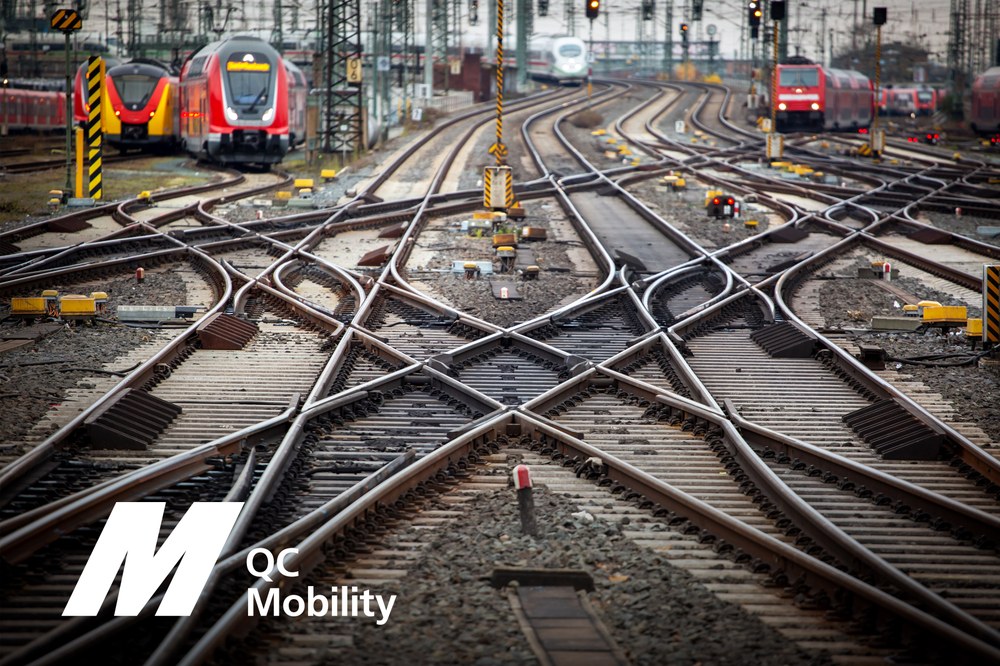Fewer delays, better route planning and timetables: quantum computing for rail transport

- In the project QCMobility Rail Transport, quantum computers for rail transport are being tested in order to solve complex planning and decision-making processes in rail transport more efficiently and reliably.
- d-fine, planqc, Hessische Landesbahn, DB InfraGO, ÖBB-Infra and the Fraunhofer Institute for Cognitive Systems IKS are all involved in the project.
- Focal points: Rail transport, quantum computing, mobility
How can highly complex planning tasks in rail transport be solved better and faster than before with the help of quantum computers? The consulting firm d-fine and the quantum computer manufacturer planqc are answering this question on behalf of the DLR Quantum Computing Initiative of the German Aerospace Center. Over the next 18 months, they will be working on the DLR QCI project "QCMobility Rail Transport" with the DLR Institute of Transportation Systems and the DLR Institute of Quantum Technologies as well as with strong project participants from research, rail transport and railway infrastructure. This will make a significant contribution to the roadmap for the future development of "quantum computing and mobility" as part of the overall QCMobility project.
Together with the DLR institutes, the consortium wants to find out how quantum computers can help to make rail transport more efficient and reliable. This is because dispatchers and transport planners are faced with highly complex decisions every day, some of which have to be made within seconds. Which train has priority if a line is blocked? How can roadworks, extreme weather events, delays or bottlenecks in the rail network be taken into account in real time? Accurate answers are crucial, because even minor disruptions can lead to major delays in a tightly synchronised operation. Long-term train path and timetable planning is also a challenge in which countless dependencies and scenarios must be taken into account, for example by considering parallel train path requests and closed sections of track.
However, existing optimisation methods that run on conventional hardware are reaching their limits. This is because the number of possibilities is growing exponentially. Quantum computers open up new perspectives here: they could calculate complex decision-making processes much faster and more comprehensively. The project QCMobility Rail Transport is therefore systematically testing for the first time how quantum-based algorithms can be used in real railway scenarios – from short-term scheduling in the event of disruptions to strategic infrastructure and timetable planning.
Hessische Landesbahn, DB InfraGO and ÖBB-Infra present use cases, experience of the challenges and processes as well as real data
The use cases come directly from project participants from the rail sector and form the basis for transferring real challenges into mathematical models and solving them with quantum-based optimisation approaches. Among other things, real timetable data and booking information are used. The aim is to compare the results with conventional methods and develop a reliable roadmap for the future use of quantum computers in the railway sector. This will make it possible to assess the potential that quantum computing actually offers for rail transport.
A consortium was put together to implement the project, combining a high level of practical relevance with scientific and technological expertise. The consortium is coordinated and managed by d-fine and planqc. Hessische Landesbahn is contributing its expertise in practical use cases, while the Fraunhofer Institute for Cognitive Systems IKS is contributing its expertise in the field of quantum methods. DB InfraGO AG and ÖBB-Infra AG are also involved as associated project participants with their many years of experience as rail infrastructure operators and provide valuable insights into the processes and real data from ongoing operations. Together, a strong network of industry, research and practice is being created to test the realistic use of quantum computers in the railway sector.
The DLR QCI project QCMobility Rail Transport is the first to systematically investigate how quantum computers can help to make rail transport more efficient, resilient and reliable – and thus make an important contribution to sustainable mobility in the future.
ABOUT THE DLR QUANTUM COMPUTING INITIATIVE
The DLR Quantum Computing Initiative (DLR QCI) brings together research, industry and start-ups to jointly develop quantum computers, manufacturing technologies and relevant use cases. To this end, DLR QCI provides them with the necessary technological infrastructure, workshops and office space at two innovation centers in Hamburg and Ulm. This is creating a strong ecosystem for the industrialisation of quantum computing in Germany, made possible by funding from the Federal Ministry of Research, Technology and Space.
